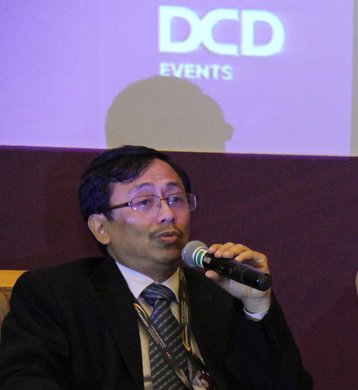Demand for data centers is booming in Indonesia, as increased digitization is helping more companies than ever understand the need for these specialized facilities. But should you build your own data center or outsource it to a third party?
It can be a tough call. The total costs of a project are often unclear, as Alvin Siagian, vice president and director of NTT Indonesia explained to us last month, Crucial cost components such as manpower and the cost of ensuring uninterrupted power are sometimes omitted when companies evaluate options, and can be unpredictable in Indonesia.
Can you make savings and provide a better service from a facility you build and run yourself, or should you look to a third party to provide it for you? To look deeper into the operational realities in Indonesia today, we spoke to two executives who are familiar with both self-managed and outsourced data centers in the country.
BYOD: Build your own DC
Dwi Kurniawan, the director of Information System Strategy and Development at the Indonesia Financial Service Authority (FSA) is no stranger to self-managed data centers. With over two decades of industry experience under his belt, he had previously worked at the Central Bank of Indonesia which operated its own data center.
“The challenge is to maintain the high availability and performance. To keep up with technology and the security. We must do our own ISO 27001 assessment, [and have] our own staff to monitor and [meet] all the requirements for certification,” said Kurniawan as he shared about the various operational challenges of a self-managed data center.
“[This works] if we have enough resources for that,” he told DCD, alluding to organizations that may be undermanned. “But if we can outsource, we could use the resources [to improve] other areas,” he said.
Staffing and security
It is also necessary to implement the stringent security measures expected of a critical facility. Kurniawan said: “[Businesses] sometimes forget that they must do it themselves. And they have to put their men in the data center on 24-hour shifts. This includes disaster recovery planning too. We have to do the business recovery exercises to ensure the availability of the infrastructure.”
Finally, operating one’s own data center also comes with the responsibility of keeping data center equipment up-to-date. Kurniawan pointed to the necessity of periodic infrastructure refreshes due to technology obsolesce or scheduled retirement of key components. And ignoring them is not an option, given the potential impact on the availability of spares.
Gunawan Santoso, the senior vice president of IT Infrastructure at payment service processor Kartuku noted that a self-managed data center would have to be operated by an in-house team. This means building a team with the right combination of skills needed to run an operational data center round-the-clock.
A self-managed data center must be operated by an in-house team, with the right combination of skills needed to run an operational data center round-the-clock
And when it comes to commissioning the data center, the headache usually revolves around getting someone with the requisite experience and know-how to build it. And Santoso should know, having headed various projects that saw him help set up three separate data center and two data center relocations previously. He told us that companies can either assign qualified employees to lead the project, or pay an external consultant to do it.
Employees of the right caliber and qualifications may not exist however, while the latter introduces an inevitable layer of cost and complexity – the hefty sums of money at stake can cast suspicion over the recommendations of an outsider. Moreover, this route can also be extremely costly, unless the consultant is only tasked with dealing with high-level decisions – with lower level tasks handled by employees.
Santoso observed that businesses from the financial services sector will also need to deal with compliance regulations as well as regulators, something which he says most internal teams are not keen to do.
Business momentum
Both Kurniawan and Santoso agreed that outsourced data centers can offer significant momentum for businesses to get things moving with an immediacy that a self-operated data center cannot match.
Business should seriously consider outsourced data centers, says Santoso, assuming they are not prevented from doing so due to regulatory rules. Santoso observed that outsourcing is easier for newcomers that are not encumbered with legacy infrastructure: “The [data center] is ready for you. You don’t have to wait months.”
“Infrastructure is old school. [Operating a] data centre is old school. Why build your own, when it is already available and price competitive? I like to focus on the speed, and the time to market [for] my business is good. It is immediately available, and the technology is ready,” he said.
Businesses should go though their contracts with a fine-tooth comb before signing on the dotted line. And it would help if outsourced providers can lay out the details to their tenants from the get go.
Kurniawan elaborated on the decision to go with an outsourced data center provider at the FAS: “[We] needed to have a good, reliable data center as soon as possible. If we used our own data centre, we would have to wait one or two years. But we needed it now. With outsourcing, we can have it in a few months.”
Kurniawan expressed confidence in the data centers in Indonesia, noting that he can be assured of availability and uptime by going the outsourced route. And the deployment size is nothing to scoff at – he told DCD that adequate space had been procured to expand up to 100 racks over the course of four to five years. He said: “By outsourcing I don’t have to [pay] for building the infrastructure.”
Santoso shared a tip to bring costs down for businesses looking to outsource, though this probably works only for bigger players with the financial clout. He said: “You still can capitalize [an outsourced data centre] if you want by converting it to capital expenditure instead of paying monthly. And it will be a good bargain if you pay in advance.”
Doing outsourcing better
Despite their praise of the outsourcing model, Kurniawan and Santoso readily came up with suggestions when we quizzed them on how outsourced providers in Indonesia can up their game. Santoso was quick to point a finger at the current pricing structure, noting that charges can add up quickly for the unwary customer.
“[Outsourced providers] should understand one thing: the stickiness of their service. Once we move into a colocation [facility], it’s not like we move out in six months and a year; it won’t be that easy. [As such], the price structure needs to be more flexible,” he said.
Santoso also called for organizations to adopt a more holistic selection criteria when selecting data centers in Indonesia, particularly if they are not familiar with the Indonesia market. This includes taking the availability of communication links into consideration, and not taking claims of carrier neutrality at face value, as the latter could be an attempt to mask the lack of communication options. He also suggested checking that shortlisted options are proper critical facility and not just some repurposed building installed with a portable air conditioning system.
Kurniawan suggested that businesses vet through their contracts with a fine-tooth comb before signing on the dotted line. And it would help if outsourced providers can lay out the details to their tenants from the get go, he said.
“I think the provider need to provides some details, [and highlight] important clause in the contract. If the prospective tenant isn’t aware [and run into difficulties], this will reduce trust in the outsourced provider,” he said. “What are the charges for networking and power consumption? Clauses in the contract that should be provided as complete as possible.”
Keep informed
And there is no question that an outsourced provider that communicates through timely updates will serve to inspire trust and build confidence.
“There should be regular updates to the [accreditation status] of the data center. Or maybe there is some security breaches of other tenants, they should inform us. Or are there important changes in the [operating] environment, or [developments] which can impact other tenants,” Kurniawan said.
Finally, keeping an eye out for the latest regulations such as those from the financial industry will certainly go a long way towards helping outsourced providers sell their services. He said: “They should ensure that tenant don’t worry, that all the requirements from the authorities will be fulfilled.”



